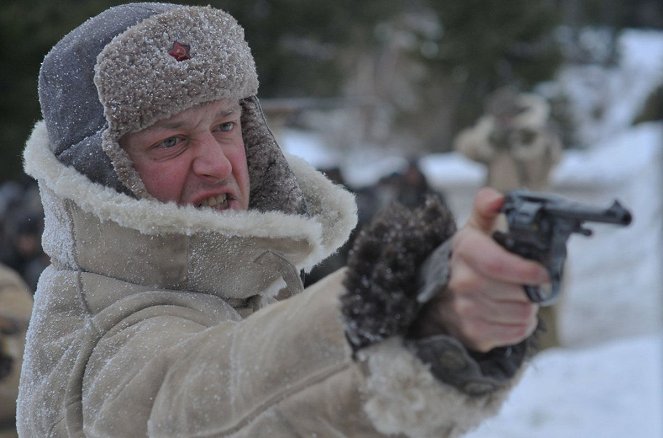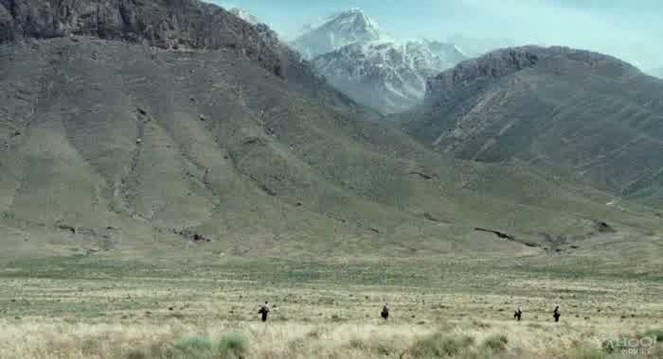Reżyseria:
Peter WeirZdjęcia:
Russell BoydMuzyka:
Burkhard von DallwitzObsada:
Jim Sturgess, Colin Farrell, Ed Harris, Saoirse Ronan, Mark Strong, Alexandru Potocean, Gustaf Skarsgård, Sebastian Urzendowsky, Dragoș Bucur (więcej)Opisy(1)
Zima 1940 roku. Młody polski oficer, Janusz (Jim Sturgess) zostaje aresztowany przez okupujące pół Polski władze sowieckie i skazany na 20 lat obozu pracy za szpiegostwo. Wraz z dwustoma innymi nieszczęśnikami zostaje przetransportowany do gułagu na Syberii. W przystosowaniu się do surowych obozowych warunków w lodowatym klimacie pomaga Januszowi rosyjski aktor Chabarow (Mark Strong), który nieopatrznie zagrał niewłaściwą rolę i został skazany za „gloryfikację arystokracji”. Chabarow zaraża Janusza pomysłem ucieczki. Jednak rezygnuje z udziału w akcji, paraliżuje go strach. Niezrażony tym Janusz organizuje ucieczkę, w której biorą udział Pan Smith, Tomasz, Kazik, Voss, Zoran i zdesperowany Walka (niemile widziany przez „politycznych”, ale wnoszący do akcji jeden niezaprzeczalny atut: nóż). Więźniowie wymykają się nocą w czasie zamieci, która ma szybko zatrzeć ślady i opóźnić pościg. (Monolith)
(więcej)Materiały wideo (1)
Recenzje (10)
Peter Weir light. The overall impression is not that powerful, but the film offers a lot of unforgettable
details. You will enjoy getting to know different characters and the importance of the positive synergy of
their natures and abilities for achieving a common goal – survival and freedom. The Way Back features a
well-chosen cast, subtle and intelligent humor, and a slow pace with just a few dramatic moments. Do
not expect big things. Watch and listen. You’ll be satisfied with having learned something, and the
characters will remain in your memory.
()
A film of two meaning planes and two faces. The Way Back is about escaping Siberia (surprisingly), a physically devastating journey through Asia, through mountains, deserts and mountains again, to get to freedom. But it also deals, on a symbolic level, with a journey through the history of Central and Eastern Europe, a path to forgiveness. Uh, oh! Like Hollywood's attempts to stage the tragedy of the Holocaust, the first attempt to stage the horrors of the Gulag gives the impression of an explanatory and average staged theatre that aims to make the viewer who is unfamiliar with the facts to understand and feel. For obvious reasons, this trick can only work in an uninspired way and without any depth. In general, however, the further away the heroes are from the traumatic space of the Gulag, the more we learn about them, and the more Weir discusses their individual stories, the better and more cinematically convincing The Way Back is (the highlight is the Mariana scene in the desert, which was the only one in the film that really moved me with the sheer power of cinematic speech). On the other hand, the closer the heroes get to great history, the more constructed the film feels – it is a high school textbook of the crimes of communism for the uninitiated. It takes away a lot of energy and authenticity (unfortunately, this is also related to the very special choice of the dominant language variant and Ed Harris as the story mediator for American audiences). You can get used to it, but the aftertaste of artificial tragedy can't be completely gotten rid of. Like all similar films, this historical trauma is obscured by mandatory sentiment rather than being open to analysis and understanding... It gets points for the excellent (and only truly ambivalent) character of the thief Valek, famously played by Colin Farell.
()
The nonsensically edited first half, which doesn't let a single scene resonate, battles with the beautifully sprawling second half that pushes the limits of the widescreen camera to the limit. This takes points off Weir's film in the final rating despite the fact that he manages to introduce his characters using only a few words and make you like them without dramatizing the scene in any drastic way; he makes do with great actors, a few frostbite marks, and swollen lips from dryness.
()
I have a soft spot for Weir, but he’s off the mark here. Actually, I think that it wasn’t reasonable to even try to make a film like this, paradoxically, for the same (or rather, opposite) reason that made me doubt 127 Hours. Whereas in Boyle’s latest, there wasn’t enough story for a feature film, in The Way Back there is too much and it feels like a bunch of haphazardly cut sections of the story of a much longer film. I can’t say I had fun, or that I feel like watching the extended (complete) version. After those 133 minutes, I felt almost as exhausted as if I had made that trek, which, as someone who likes comfort, is not something I can appreciate.
()
Back from Siberia. Let’s go, they said. And so they walked and walked... However, Weir didn’t realize that without a good screenplay this wouldn’t gain much pace as a drama and that it probably just shuffle along. See, this is an unworthy substitute for Seven Years in Tibet and As Far as My Feet Will Carry Me (even more so since it’s made up, however Papillon showed that isn’t always necessarily bad). Otherwise, it’s too bad that those two adaptations escaped him (doubly so, because then they wouldn’t have been badly-made movies). And nobody knows how to draw you in like Peter Weir. It felt like I was tramping that interminable trail myself (meant in a good way), I felt what the characters felt at every moment, I was there. So from my point of view enjoyed and endured, and therefore it’s outstanding.
()
Galeria (75)
Photo © Newmarket Films



Reklama